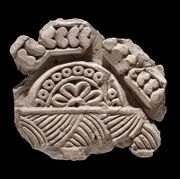Difference between revisions of "Stucco"
m (Text replace - "== Authority ==" to "== Sources Checked for Data in Record ==") |
|||
| (2 intermediate revisions by 2 users not shown) | |||
| Line 1: | Line 1: | ||
| + | [[File:Persian plaque 39492.jpg|thumb|Stucco plaque<br>MFA# 39.492]] | ||
== Description == | == Description == | ||
| − | 1) (exterior) A durable plaster used as a protective finish on masonry and walls. Exterior stucco is usually composed of cement, sand, and lime. It is mixed with water and applied wet. Stucco has been used since early times as a protective finish over unbaked brick and stones. Occasionally, pebbles or other aggregate are added for texture. See also [ | + | 1) (exterior) A durable [[plaster]] used as a protective finish on masonry and walls. Exterior stucco is usually composed of [[cement]], [[sand]], and [[lime]]. It is mixed with water and applied wet. Stucco has been used since early times as a protective finish over unbaked [[brick]] and [[stone|stones]]. Occasionally, pebbles or other aggregate are added for texture. See also [[pebble%20dash|pebble dash]], [[roughcast|roughcast]], [[tabby|tabby]], and [[spatter%20dash|spatter dash]]. |
| − | 2) (interior) A hard plaster used for covering walls and ceilings. Interior stucco was made usually made with [ | + | 2) (interior) A hard plaster used for covering walls and ceilings. Interior stucco was made usually made with [[gypsum|gypsum]], [[marble%20dust|marble dust]] and [[glue|glue]]. It was often molded into ornamental shapes and polished to a marblelike finish. During the 17th and 18th centuries, elaborate painted figures and ornaments were made with stucco. |
== Synonyms and Related Terms == | == Synonyms and Related Terms == | ||
| Line 11: | Line 12: | ||
2: stuck; stuc (Fr.) | 2: stuck; stuc (Fr.) | ||
| − | == | + | == Resources and Citations == |
* R. J. Gettens, G.L. Stout, ''Painting Materials, A Short Encyclopaedia'', Dover Publications, New York, 1966 | * R. J. Gettens, G.L. Stout, ''Painting Materials, A Short Encyclopaedia'', Dover Publications, New York, 1966 | ||
Latest revision as of 14:40, 22 August 2020
Description
1) (exterior) A durable Plaster used as a protective finish on masonry and walls. Exterior stucco is usually composed of Cement, Sand, and Lime. It is mixed with water and applied wet. Stucco has been used since early times as a protective finish over unbaked Brick and stones. Occasionally, pebbles or other aggregate are added for texture. See also Pebble dash, Roughcast, Tabby, and Spatter dash.
2) (interior) A hard plaster used for covering walls and ceilings. Interior stucco was made usually made with Gypsum, Marble dust and Glue. It was often molded into ornamental shapes and polished to a marblelike finish. During the 17th and 18th centuries, elaborate painted figures and ornaments were made with stucco.
Synonyms and Related Terms
1: lime stucco
2: stuck; stuc (Fr.)
Resources and Citations
- R. J. Gettens, G.L. Stout, Painting Materials, A Short Encyclopaedia, Dover Publications, New York, 1966
- Ralph Mayer, A Dictionary of Art Terms and Techniques, Harper and Row Publishers, New York, 1969 (also 1945 printing)
- Dictionary of Building Preservation, Ward Bucher, ed., John Wiley & Sons, Inc., New York City, 1996
- Random House, Webster's Encyclopedic Unabridged Dictionary of the English Language, Grammercy Book, New York, 1997
- The American Heritage Dictionary or Encarta, via Microsoft Bookshelf 98, Microsoft Corp., 1998
- Art and Architecture Thesaurus Online, http://www.getty.edu/research/tools/vocabulary/aat/, J. Paul Getty Trust, Los Angeles, 2000
